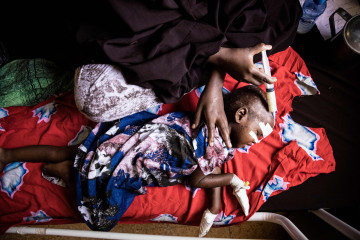

The world is paying too little attention to a slew of mass displacements of people across Africa, risking starvation, deaths and prolonging conflicts, the Norwegian Refugee Council has warned in a report.
"With the all-absorbing war in Europe's Ukraine, I fear African suffering will be pushed further into the shadows," the aid group's chief Jan Egeland said in a statement. It is the first time that all 10 crises on the Council's annual list are on the African continent.
The countries with the most neglected crises according to the NRC are, in order: the Democratic Republic of Congo (DRC), Burkina Faso, Cameroon, South Sudan, Chad, Mali, Sudan, Nigeria, Burundi and Ethiopia.
"The war in Ukraine has demonstrated the immense gap between what is possible when the international community rallies behind a crisis, and the daily reality for millions of people suffering in silence within these crises on the African continent that the world has chosen to ignore"
"Children, especially small children, are bearing the brunt of a harrowing and multifaceted crisis in Ethiopia," said Xavier Joubert, Save the Children's country director in Ethiopia.
About 185,000 children are now estimated to be suffering from the most deadly form of malnutrition, while over one million people need urgent food aid across the Ethiopian regions of Oromia, SNNP (Southern Nations, Nationalities and Peoples), Somali and South West.
Meanwhile, in Somalia, more than 7.1 million Somalis now face crisis-level food insecurity or worse, according to a joint statement from the UN's World Food Program(FFP), the Food and Agriculture Organization (FAO), the UN's Children Agency UNICEF and the UN Office for the Coordination of Humanitarian Affairs (OCHA).
"Somalia is in danger of entering an unprecedented fifth consecutive failed rainy season, meaning hundreds of thousands of people face the risk of famine," said Adam Abdelmoula, the United Nations (UN) Humanitarian Coordinator in Somalia. "Famine cost the lives of 260,000 Somalis in 2010-2011."
Furthermore, four consecutive rainy seasons have failed in the Horn of Africa, with a fifth expected on the way, causing the worst drought in 40 years and a major hunger crisis spanning Kenya, Ethiopia and Somalia.
In the DRC, the most-neglected country on the list for the second year running, around 27 million people went hungry last year, or one-third of the population. Meanwhile, 5.5 million people were internally displaced, the aid group said, with a further one million fleeing abroad.
"Somalia is in danger of entering an unprecedented fifth consecutive failed rainy season, meaning hundreds of thousands of people face the risk of famine"
But there were no high-level meetings or donor conferences about the DRC's hunger crisis or the conflict in the country's east, and only 44 percent of the $2.0 billion requested by the UN for humanitarian aid was received.
By contrast, the NRC highlighted that it took just one day this March for a humanitarian appeal for Ukraine to be almost fully funded.
"The war in Ukraine has demonstrated the immense gap between what is possible when the international community rallies behind a crisis, and the daily reality for millions of people suffering in silence within these crises on the African continent that the world has chosen to ignore," NRC head Egeland said.
In other countries on the Council's list, climate shocks such as droughts and floods have exacerbated food crises, while conflicts or endemic violence both put civilians to flight and made it harder for aid groups to reach them. And lack of press freedom in many affected nations raises the hurdle to media coverage even higher.
The NRC noted that seven of the 10 countries on its list had made repeated appearances in recent years.
"This points to a vicious cycle of international political neglect, limited media coverage, donor fatigue, and ever-deepening humanitarian needs," the report said.
The aid group called for "adequate attention" from the UN Security Council and other international bodies, with measures like assigning one or more members to "champion" specific displacement crises and support for NGOs working on the ground.
It also suggested steps to address donor fatigue, such as governments committing steady funding flows rather than one-off pledges.
And it called on members of the public to continue pressuring their governments to help countries in crisis and support media that cover "forgotten conflicts".




 Follow the Middle East's top stories in English at The New Arab on Google News
Follow the Middle East's top stories in English at The New Arab on Google News


